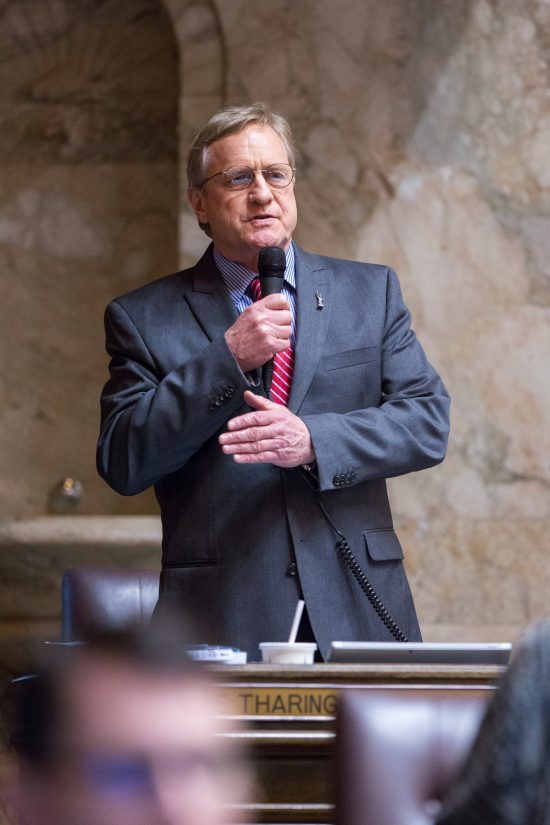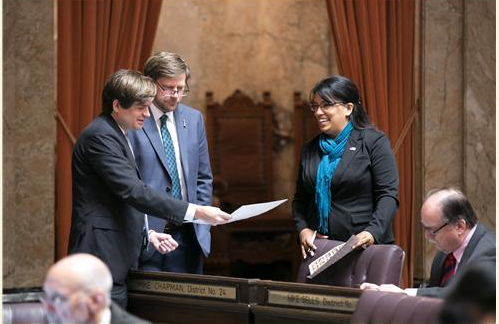Education, health care and public safety
OLYMPIA—At the mid-way point of the 2017 session, Rep. Steve Tharinger (D-Dungeness) and Rep. Mike Chapman (D-Port Angeles) say the House of Representatives has passed key measures on education, health care and public safety.
“The first bill we passed in the House was to fix the levy cliff so our local schools wouldn’t lose funding, and it came back from the senate with minor changes—so we were happy to send it to the governor to be signed into law,” said Rep. Tharinger, chair of the Capital Budget Committee. “There’s more work to do, but this is great news for our schools.”
With the passage of the school levy fix, local schools are protected from painful cuts that could have led to teachers and staff getting pink slips.
Here are the estimated cuts at local school districts prevented by the levy cliff legislation: Port Townsend School District ($487,848), Chimacum School District ($530,571), Quillayute Valley School District ($65,381), Cape Flattery School District ($173,216) and the Port Angeles School District ($412,943).
Tharinger also highlighted a number of health care reforms that passed the House and are now being considered in the Senate:
- Improving care at assisted living facilities (House Bill 1492 by Rep. Tharinger) — This law would strengthen the penalties for assisted living facilities and long-term care providers for violations of licensing and inspection standards.
- Ending surprise medical bills (House bill 2114 by Rep. Eileen Cody) — Weeks after having paid a visit to an emergency room or a surgery performed, some patients receive surprise bills for “out-of-network” services. The hospital was in-network, your surgeon was in network, but the anesthesiologist wasn’t. It’s called “balanced billing” and it’s affecting families across Washington. No one should be afraid of unexpected bills when seeking health care they need.
- Helping rural hospitals (House Bill 1520 by Rep. Tharinger) — Small, rural hospitals are often the only health provider for a community. This legislation ends flaws in the system that penalized rural hospitals for reducing use of emergency rooms in favor or primary care and makes other reforms to make sure our rural hospitals stay healthy so families can stay healthy.

Rep. Chapman, serving his first session, introduced four pieces of legislation. All four passed the House:
- Property tax reform (House Bill 1283) — Eliminates the requirement that advance taxes must be collected before any document is filed with the county auditor to divide, alter, or adjust real property boundary lines.
- Bike racks (House Bill 1149) — Allows public transit vehicles to have longer bike racks to accommodate travelers.
- Transportation funding without new taxes (HB 1502) — Allows WA Department of Transportation to sell commercial advertising on their website, therefore raising some funding to improve transportation without having to raise new taxes.
- Forest riparian easements (HB 1531) — Directs the Department of Natural Resources to share information regarding the Forest Riparian Easement Program with other state programs, and to promote the expansion of the Forest Riparian Easement Program. The forest and fish law prevented the harvest of many trees that otherwise could have been harvested, and the riparian easement program helps forest owners recover some of the lost money.
The House also passed new laws cracking down on drunk driving (House Bill 1614) and texting while driving (House Bill 1371).
“If you look at the numbers, texting while driving is now almost as big of a threat on our roads as drunk driving,” said Chapman, a former law enforcement officer who serves on the Transportation Committee. “Nobody driving to work or taking their kids to a baseball game should have to worry about getting hit by a drunk or by somebody trying to type on their iPhone. So I’m proud to have voted yes on those bills because they will save lives.”

What’s next
Now that the deadline to pass policy bills to the Senate (and vice versa) has passed, Tharinger said the session will change focus to finding compromises on the three major budgets:
- the state operating budget, which pays for public schools, universities, courts, prisons, seniors, the disabled, health care and early learning;
- the transportation budget, including ferries and the State Patrol; and
- the capital budget, which builds schools, colleges, parks and other state construction projects.
“The biggest job we still have left is fully funding our public schools,” Tharinger said. “That includes paying for basic education, such as teacher salaries, and it includes building new schools to reduce overcrowded classrooms.”
Senate Republicans are scheduled to come out with their budget proposals first, later this month, then the House Democrats will follow with their budget proposals.
Chapman said repairing and replacing the Elwha River Bridge is a major budget priority for the 24th District, since the structure was built in 1926 and is long past its expected lifespan.
“That bridge and Highway 101 are what connects our communities and businesses,” Chapman said. “As the winter snow melts, we expect major changes to the water levels and flow patterns of the Elwha River. Given this year’s growing snowpack, there is concern that unpredicted extensive damage to the piers could occur. So fixing that bridge is critical for people can still get where they need to go—including to the hospital—and for getting our goods to market through local ports.”
Telephone town hall
Tharinger, Chapman and Sen. Kevin Van De Wege will host a telephone town hall on at 6 p.m. March 14 to give constituents a chance to ask questions, offer ideas and get an update about issues important to the 24th District.
Most households in the district will receive a call at around 6 pm. All you have to do is stay on the line to participate. Press *3 on our phone at any time to ask a question.
If you would like to participate and do not get a call, dial 877-229-8493 and use ID Code 116281.
